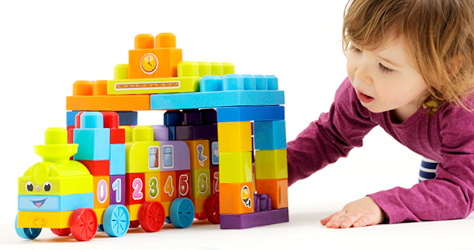Isn’t it amazing watching your toddler get completely lost in a play world they’ve created?
It’s great that they’ve learned how to play on their own and use their imagination, but before we sign with relief and sneak away to catch up on household chores, it’s worth knowing that playing with our children – and family time together - is really beneficial too.
At a glance
- Isn’t it amazing watching your toddler get completely lost in a play world they’ve created?
- Children under five learn best by doing things themselves
- Play is so important to brain development, motor development, attachment and bonding

Recent research shows that as parents we aren’t spending as long as our parents’ generation playing with our kids. It’s easy to see why it’s happened: with children’s TV on tap and tablets loaded up with mesmerising apps, it can seem easier to leave them in front of a screen while we get on with other things. After all, we reason, aren’t the apps and TV programmes we’ve chosen educational?
Yes, that may be true, but - as with everything – balance is the key. Children under five learn best by doing things themselves, using all their senses to experience something new, rather than by watching someone on a screen do the same thing.
That doesn’t mean we need to be intensively playing with them all day (that would be wrong too, and slightly oppressive for them).
But experts such as child psychologist Professor Tanya Byron recommend at least half an hour of non-screen uninterrupted parent-and-child playing time each day for all ages. “It’s so important to switch off your phone and open up communications between you, saying in effect ‘you’re important to me, I’m here for you’,” she says. “Play is so important to brain development, motor development, attachment and bonding. You often hear young children say things like, ‘we want to play like we do at Christmas’.”
That means simply getting down on the floor with them, turning off the phone and TV and relaxing into slow-time, much as we do over the Christmas holidays.
The benefits of family playing time are many.
We can be a source of new ideas and techniques for their favourite toys. Maybe they can build a tall tower from their blocks, but have they thought of building one with a wide base so it’s harder to knock down?
Or using them to build a house with a roof? Or tipping a ball off the top? If they’ve got a playset with loads of options, like the Megabloks’ Fast Tracks Rescue Team, we can model different ways of playing: how many levels and ramps will our town have? Will the robber get away?
Don’t take over, but we can be there to throw in suggestions, and provide a running commentary, asking open-ended questions that show we’re fully engaged in their world. (‘That’s a tall tower – why not back this up with the Mega Bloks 60 piece big building bag? – is there room for one more brick?’ ‘Oh, it’s wobbling’....’What shall we do now?’)
These toy is also great for mimicking those ‘can we play like we do at Christmas’ moments encouraging everyone to get down and play together.
That way we’re helping their language development, modelling new ideas and concepts – and we’re also there to support them through the inevitable frustrations when something they’ve built falls apart or is demolished by a sibling. That way, they can see it’s not the end of the world and can learn resilience, concentration and patience.
Playing with a sibling also brings its own benefits (as well as the odd irritation). Although children aren’t developmentally ready to share until they’re nearer three, we can encourage it at two when we’re playing with them by saying ‘your turn to put a brick on the tower’; ‘now it’s your brother’s turn’.
Family play enables them to practise all these vital social skills in a supportive environment; they’ll gradually learn that collaboration is fun and it allows them to play more sophisticated games.
But this learning isn’t all one way; we learn a lot by observing them at play: what really interests them? What kind of temperament do they have? If we’re on the floor with them, we can share their joy at creating something in real-time, rather than congratulating them when it’s done.
And we may find ourselves benefiting too, in all sorts of unexpected ways. In our technology-filled, fast-paced world, it can be life-affirming to switch into ‘slow-time’, turn off our phones and really get into a game with our child.
Their smiles of delight will tell us all we need to know.